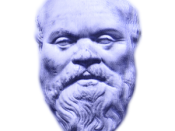Question 1: Key Developments in Western Thought1.1 IntroductionIn the following paper I will seek to explore the thought patterns throughout history that have made the Western outlook on life as it is today. In order to do this I will focus on the main philosophers and their philosophies. I will attempt to tie this in with our way of thinking within the 20th century.
1.2Greek AntiquityThe major contribution of the Greek philosophers and their schools of thought are that they helped humanity move away from myths and the supernatural toward a more naturalistic and reasoned look at the world (Hergenhahn, 2005, pp.54). Another vital aspect is that they encouraged open analysis and criticism of their ideas.
The beginning of the movement away from legendary explanations of the world can be seen in the work of Thales (ca. 625-547 BC). He maximized natural explanations of the world and tried to prove it by various experiments.
He encouraged people to question and criticize his words. Because of his innovation he has been called the "father of philosophy".
A question that plagued the philosophy of that time was the problem of change. Parmenides (circa 515-445 BC) was of the opinion that nothing could actually change since that would make it unstable. Heraclites (circa 550-480 BC) opposed this and stated that everything is in a constant state of change which is caused by the tension between opposites. This seems to have influenced our view that nothing is certain. During this time we can also see the beginning of two fundamental Western schools of thought that we will discuss later, empiricism and rationalism. Heraclites was an empiricist whereas Parmenides was a rationalist (Hergenhahn, 2005, pp.29-30). With Parmenides we also see the start of logical argumentation (www.friesian.com). This was a vital turning point in Greek thought...


